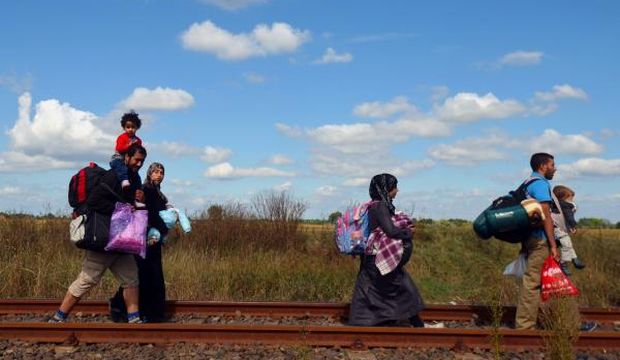I was recently on a trip to Europe and waited for three hours at the Calais train station before I was able to reach the UK. Due to the delays caused by large numbers of migrants in Calais, I arrived in London after midnight. Such chaos obstructing railway activity is no longer unusual since the waves of migrants who made their way into Europe have become the European Union’s biggest security, economic, and legal challenges. The bloc is currently holding meetings to finalize laws to resolve the problem and there is even talk of forming a naval power in the Mediterranean to prevent illegal migration—a step that will require international approval.
Despite complaints, the number of migrants arriving in Europe is still reasonable—it is possible they can be accommodated on the continent. There are currently around 200,000 illegal migrants on European shores. However, EU governments fear that more will follow. It is possible that the millions fleeing Africa and Asia will be willing to cross seas to arrive in Europe. If this happens, the situation may get out of control, placing Europe in a near-state of war. Perhaps one Spanish official exaggerated this point when he warned that Europeans will become a minority in their own countries due to a migrant “invasion.”
The question is: Why has the migrant flow into Europe suddenly surged now? What has opened up these perilous sea routes for them?
One Arab analyst asserted that there are governments in the region intentionally pushing people to escape. This is incorrect; the flow of migrants into Europe has only become a problem now due to two reasons: the first is the collapse of regimes that were previously, but no longer, able to guard their own shores, with Libya and Syria being the main two examples; the absence of order has made the Mediterranean an open space for both smugglers and refugees. The second reason is the spread of conflicts that have pushed thousands to seek refuge abroad. This is to be expected in light of the hundreds of thousands killed in Syria, Libya, and other countries, and the displacement of more than 12 million people. It is therefore reasonable to expect that the number of people fleeing to Europe may even double in the coming months.
Truth be told, the issue of migrants heading to Europe due to conflicts in the Middle East has been widely discussed in recent years—particularly following the Arab Spring. What we are witnessing now should therefore come as no surprise to us. However, EU governments have been caught off guard by the phenomenon as its effects have only just begun to hit them. If Europe is this worried about the entry of 200,000 people then we should now realize the difficult circumstances which countries like Lebanon, Jordan, and Turkey—who have limited economic capabilities—have experienced as millions of refugees have fled to their cities and camps in recent years.
The EU and the international community now have two tasks they need to carry out in order to curb the crisis. The first is to support countries which already sponsor refugees and provide essential services for them to stay. The second is to intervene in ending the tragedies in Syria and Libya. Hesitant policies have prolonged the struggle and, in the end, we trust that collective military intervention will eventually take place. This will be the only solution to ending these wars and helping the refugees return and resettle in their home countries.
Without the support of neighboring countries who are hosting refugees and without military intervention, millions of people fleeing these conflict will continue to attempt the journey into Europe, a stable continent with an economy capable of accommodating them—and the situation will worsen.
